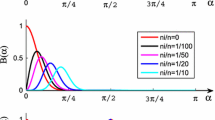Abstract
This paper demonstrates the use of entanglement resources in quantum speedup by presenting an algorithm which is the generalization of an algorithm proposed by Goswami and Panigrahi (Essentiality of entanglement in a quantum algorithm, 2017. arXiv:1706.09489). We generalize the algorithm and show that it provides deterministic solutions having an advantage over classical algorithm. The algorithm answers the question of whether a given function is constant or balanced and whether two functions are equal or unequal. Finally, we experimentally verify the algorithm by using IBM’s five-qubit quantum computer with a high fidelity.






Similar content being viewed by others
References
Deutsch, D., Jozsa, R.: Rapid solution of problems by quantum computation. Proc. R. Soc. Lond. A: Math. Phys. Eng. Sci. 439, 553–558 (1992)
Deutsch, D.: Quantum theory, the Church–Turing principle and the universal quantum computer. Proc. R. Soc. Lond. A: Math. Phys. Eng. Sci. 400, 97–117 (1985)
Goswami, A.K., Panigrahi, P.K.: Essentiality of Entanglement in a Quantum Algorithm. (2017). arXiv:1706.09489
IBM Q. http://research.ibm.com/ibm-q/. Accessed 16 May 2018
Huffman, E., Mizel, A.: Violation of noninvasive macrorealism by a superconducting qubit: implementation of a Leggett–Garg test that addresses the clumsiness loophole. Phys. Rev. A 95, 032131 (2017)
Alsina, D., Latorre, J.I.: Experimental test of Mermin inequalities on a five-qubit quantum computer. Phys. Rev. A 94(1), 012314 (2016)
Berta, M., Wehner, S., Wilde, M.M.: Entropic uncertainty and measurement reversibility. New J. Phys. 18(7), 073004 (2016)
Devitt, S.J.: Performing quantum computing experiments in the cloud. Phys. Rev. A 94(3), 032329 (2016)
Linke, N.M., Maslov, D., Roetteler, M., Debnath, S., Figgatt, C., Landsman, K.A., Wright, K., Monroe, C.: Experimental comparison of two quantum computing architectures. PNAS 114(13), 3305–3310 (2017)
Wootton, J.R.: Demonstrating non-Abelian braiding of surface code defects in a five qubit experiment. Quantum Sci. Technol. 2(1), 015006 (2017)
Behera, B.K., Banerjee, A., Panigrahi, P.K.: Experimental realization of quantum cheque using a five-qubit quantum computer. Quantum Inf. Process. 16, 312 (2017)
Sisodia, M., Verma, V., Thapliyal, K., Pathak, A.: Teleportation of a qubit using entangled non-orthogonal states: a comparative study. Quantum Inf. Process. 16, 76 (2017)
Sisodia, M., Shukla, A., Pathak, A.: Experimental realization of nondestructive discrimination of Bell states using a five-qubit quantum computer. Phys. Lett. A 381, 3860–3874 (2017)
Sisodia, M., Shukla, A., Thapliyal, K., Pathak, A.: Design and experimental realization of an optimal scheme for teleportion of an n-qubit quantum state. Quantum Inf. Process. 16, 292 (2017)
Majumder, A., Mohapatra, S., Kumar, A.: Experimental Realization of Secure Multiparty Quantum Summation Using Five-Qubit IBM Quantum Computer on Cloud. (2017). arXiv:quant-ph/1707.07460v1
Kalra, A.R., Prakash, S., Behera, B.K., Panigrahi, P.K.: Experimental Demonstration of the No Hiding Theorem Using a 5 Qubit Quantum Computer (2017). arXiv:quant-ph/1707.09462v1
Ghosh, D., Agarwal, P., Pandey, P., Behera, B.K., Panigrahi, P.K.: Automated Error Correction in IBM Quantum Computer and Explicit Generalization (2017). arXiv:1708.02297
Vishnu, P.K., Joy, D., Behera, B.K., Panigrahi, P.K.: Experimental Demonstration of Non-local Controlled-Unitary Quantum Gates Using a Five-Qubit Quantum Computer (2017). arXiv:1709.05697
Nielsen, M.A., Chuang, I.L.: Quantum Computation and Quantum Information, 10th edn. Cambridge University Press, New York (2010)
Acknowledgements
SG is financially supported by KVPY scholarship. MP and BKB acknowledge the support of INSPIRE fellowship, awarded by the Department of Science and Technology, Government of India. SG and MP would like to thank IISER Kolkata for providing hospitality during which a part of this work was completed. We are extremely grateful to IBM quantum experience project. The discussions and opinions developed in this paper are only those of the authors and do not reflect the opinions of IBM or any of it’s employees.
Author information
Authors and Affiliations
Corresponding author
Additional information
Sayan Gangopadhyay and Manabputra have contributed equally to this paper.
Rights and permissions
About this article
Cite this article
Gangopadhyay, S., Manabputra, Behera, B.K. et al. Generalization and demonstration of an entanglement-based Deutsch–Jozsa-like algorithm using a 5-qubit quantum computer. Quantum Inf Process 17, 160 (2018). https://doi.org/10.1007/s11128-018-1932-8
Received:
Accepted:
Published:
DOI: https://doi.org/10.1007/s11128-018-1932-8




